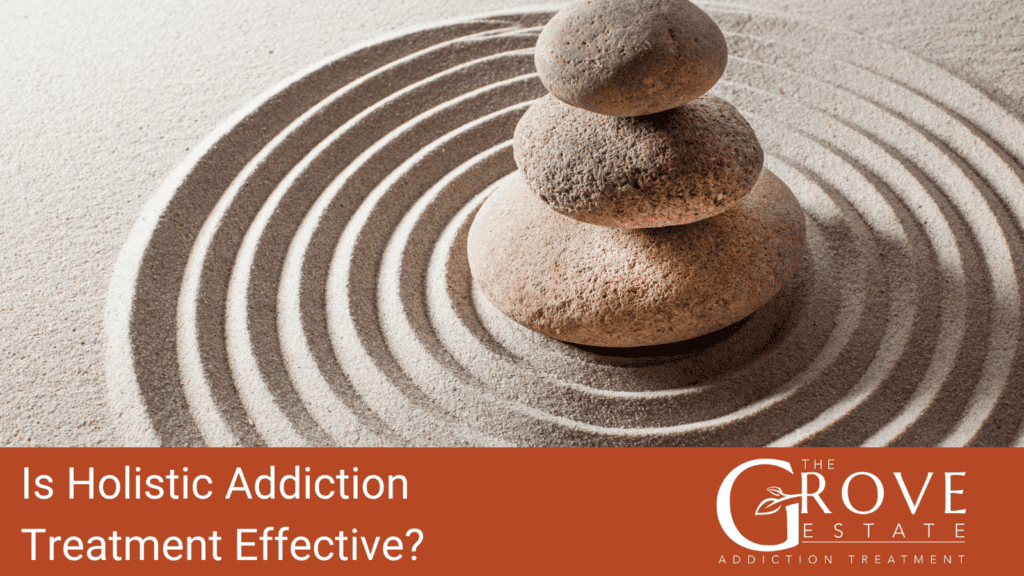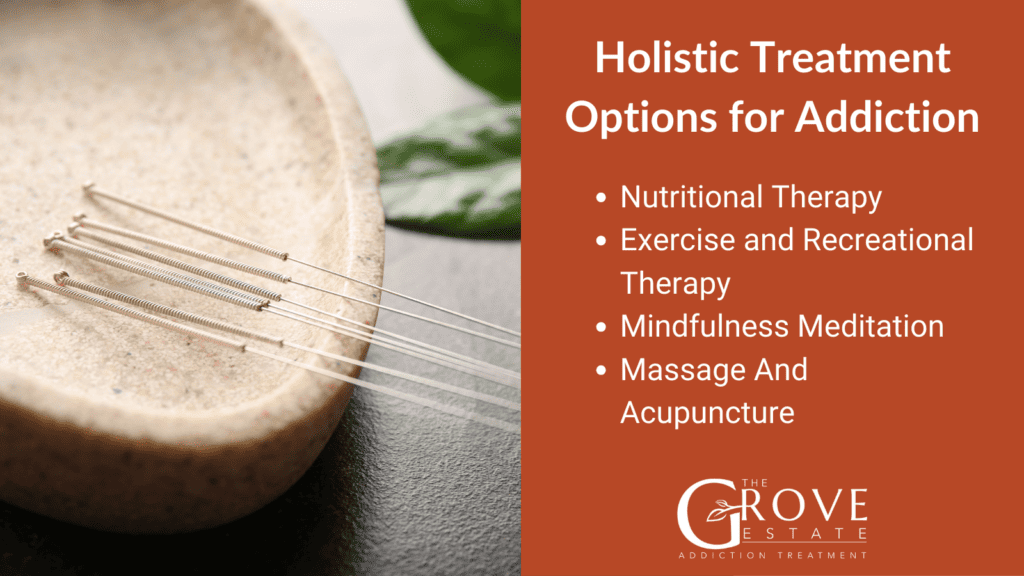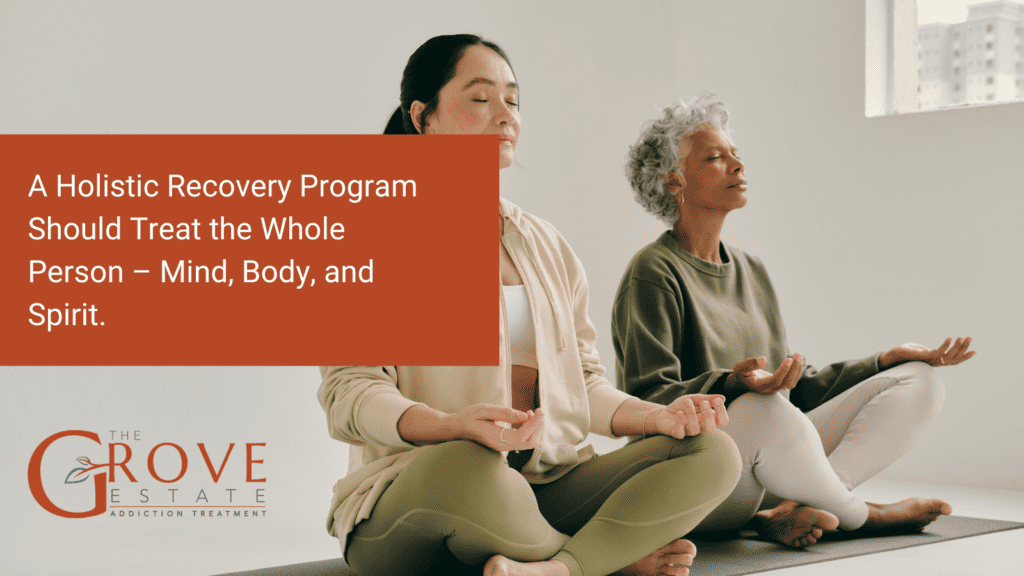Holistic addiction treatment combines traditional and complementary therapies to heal the mind, body, and spirit. Techniques like yoga, meditation, art therapy, music therapy, equine therapy, acupuncture, dance/movement therapy, and nutritional counseling enhance recovery.
This approach teaches healthy coping strategies, manages stress and negative emotions, and strengthens the mind-body-spirit connection during recovery.
Holistic addiction treatment offers various benefits beyond conventional talk therapy alone. It teaches healthy coping strategies to better manage stress and negative emotions that can trigger relapse. This comprehensive approach also promotes self-discovery and forges a deeper mind-body-spirit connection to provide strength and meaning to recovery.
What Is Holistic Addiction Treatment?
Holistic Addiction Treatment is an approach that considers the interconnected aspects of an individual’s well-being, addressing mind, body, and spirit in addiction recovery. This integrative approach includes non-medicinal methods like acupuncture, meditation, and yoga. Substance addictions to drugs or alcohol can arise from various factors, including physical, emotional, social, and spiritual aspects.
Holistic addiction treatment programs incorporate these techniques, providing a comprehensive approach to address the multifaceted challenges associated with substance use disorders. When compared to traditional methods, holistic addiction therapy is considered a simple addition to a daily routine with a significant return on investment. It is a cornerstone of quality rehab programs, repeatedly employed due to its strong ability.

Is Holistic Addiction Treatment Effective for Substance Abuse Treatment?
Holistic addiction treatment has demonstrated effectiveness by addressing substance abuse through a comprehensive, whole-person approach. Holistic addiction treatment focuses on overcoming obstacles by aligning the mind, body, and spirit.
This approach not only treats the symptoms but views individuals holistically, leading to improved recovery and overall well-being.
Research from the National Institutes of Health emphasizes a holistic model for substance abuse treatment, combining traditional modalities with holistic approaches like art therapy to address thoughts and feelings.

Holistic Addiction Treatment Options
Holistic addiction therapies encompass a range of non-traditional methods that address the physical, emotional, and spiritual aspects of addiction. Unlike conventional treatments, these holistic approaches consider the whole person, aiming to promote overall well-being and support recovery. Here are insights into specific types of holistic addiction therapies:
Nutritional Therapy
Nutritional therapy focuses on optimizing nutrition to support physical and mental health during addiction recovery. By addressing deficiencies caused by substance abuse, it promotes overall wellness. Adopting a balanced diet rich in essential nutrients, and personalized guidance from a nutritionist. Processes involve nutritional assessments, personalized meal plans, and education on healthy eating habits.
Exercise and Recreational Therapy
This therapy involves physical activities to enhance physical fitness and mental well-being. It reduces stress, boosts mood, and provides a positive outlet for emotional expression. Choosing enjoyable activities and gradually increasing intensity based on individual fitness levels. Processes encompass tailored exercise plans, group activities, and outdoor adventures.
As per a study published by Elisabeth Zschucke, exercise has been associated with a lower prevalence of mental disorders, including substance use disorders, and has shown therapeutic effects in other mental disorders such as depression and anxiety.
Mindfulness Meditation
Mindfulness meditation cultivates awareness and presence at the moment, reducing automatic, addictive behaviors. It alleviates stress, anxiety, and cravings by promoting a non-reactive mindset. Start with short sessions and gradually extend durations. Processes involve guided meditation, mindful breathing exercises, and integrating mindfulness into daily activities.
According to a paper with the DOI 10.2147/SAR.S145201, authored by Sarah E. Priddy, Matthew O. Howard, Adam W. Hanley, Michael R. Riquino, Katarina Friberg-Felsted, and Eric L. Garland, mindfulness meditation holds promise in treating substance use disorders (SUDs) and preventing relapse.
Massage And Acupuncture
Physical therapies like massage and acupuncture address both physical and emotional aspects of addiction. They promote relaxation, reduce muscle tension, and aid in overall stress management. Communicate your preferences with therapists, and consistent sessions enhance therapeutic benefits. Processes include massage sessions, acupuncture treatments, and integrative approaches combining various therapeutic modalities.
Holistic addiction therapies provide a holistic approach to recovery, emphasizing the interconnectedness of physical, mental, and emotional well-being.
Benefits of Holistic Addiction Treatment
Here is a detailed list of the benefits of holistic addiction treatment:
- Develops healthy coping skills to manage stress and negative emotions
- Therapies like yoga, art therapy, and music therapy teach emotion-regulation techniques
- Provide new hobbies and activities for stress relief without substances
- Fosters spiritual connection and sense of purpose
- Encourages exploration of spirituality and meaning beyond the individual
- Helps find fulfillment, motivation, and reason to stay sober
- Lowers risk of relapse
- Coping skills and purpose help prevent relapse triggers
- Addresses underlying issues and trauma that can lead to relapse
- Improves overall physical and mental health
- Therapies like yoga, meditation, and nutrition benefit physical health
- Addresses co-occurring mental health issues that accompany addiction
- Increases self-esteem and strengthens sense of identity
- Allows safe space for self-reflection and exploration
- Heals feelings of shame, and doubt and promotes self-acceptance
- Provides a variety of complementary addiction treatment options
- Adds holistic options like art, music, animal therapy to traditional talk therapy
- Allows customization to individual’s needs and preferences
- Offers individualized treatment plans
- The holistic approach considers the whole person’s situation and needs
- Carefully tailors combinations of therapies to each person
Disadvantages of the Holistic Treatment Program
Here is a detailed list of potential disadvantages of the holistic treatment program –
- They have limited research and evidence base for the effectiveness of some holistic therapies like herbal treatments, aromatherapy, etc. More studies are needed.
- Can be more costly or take longer than conventional treatments since a variety of therapies are used.
- Some techniques like acupuncture and hypnosis may cause fear or lack of confidence in certain individuals.
- Risk of potentially dangerous interactions between herbal supplements and prescription medications. Safety is not fully characterized.
- Lack of coverage by health insurance providers for many holistic therapies. Can become expensive for individuals to pay out-of-pocket.
- Emphasis on treating the “whole person” could divert focus from treating addiction itself using evidence-based approaches like CBT, MAT etc.
- Relaxation techniques alone may not adequately address underlying psychological issues driving addictive behaviors.
- Treatment centers offering holistic therapies vary greatly in quality of care, and credentials of staff, making it difficult to assess effectiveness.
- For severe substance abuse cases, holistic therapies may not provide enough structure or intensity needed for successful recovery.

What a Holistic Recovery for Addiction Should Look Like
A holistic recovery program should treat the whole person – mind, body, and spirit. It should utilize a variety of therapies and modalities to promote healing physically, mentally, emotionally, and spiritually.
Some key elements of a holistic recovery program might include:
- Detoxification through natural methods like nutrition, supplements, hydrotherapy, exercise, etc rather than medication-only
- Individual and group counseling to understand the root psychological causes underlying addiction
- Meditation, yoga, and mindfulness practices to reduce stress, improve coping abilities
- Good nutrition education and fitness routines to improve physical health
- Art therapy, music therapy, and other creative outlets to express emotions in a healthy way
- Acupuncture or other alternative therapies to help restore balance and well-being
- Spiritual practices like prayer or native ceremonies nourish one’s soul and purpose
The goal is to heal the whole self through natural detox methods, counseling, healthy lifestyle changes, creative expression, spiritual connection, and alternative treatments.
Rather than focusing only on stopping substance use, a holistic approach aims to uncover the root causes of addictive behaviors across all aspects of one’s health. The result should be lasting lifestyle changes that support long-term recovery and improved quality of life.
Can You Combine Holistic and Conventional Approaches to Substance Abuse?
It is possible to combine holistic and conventional approaches to substance abuse treatment. Many addiction treatment centers and programs recognize the benefits of an integrative model that utilizes both evidence-based conventional therapies as well as complementary holistic therapies.
Some key reasons why combining approaches can be helpful:
- Holistic therapies like acupuncture, yoga, and art therapy can enhance relaxation, and stress relief efforts that support the recovery process along with conventional talk therapy and counseling.
- Holistic nutrition and fitness programs can improve physical health and aid neurochemical balance in the brain alongside medications like methadone and buprenorphine.
- Conventional medical detox and medications provide critical care in early treatment stages, while meditation and mindfulness practices build important recovery skills.
- Holistic creative outlets allow the expression of emotions/experiences that counseling then helps process and integrate.
- Participating in holistic therapies can increase patient motivation/engagement with treatment.
- An integrative approach meets the bio-psycho-social-spiritual needs important for sustained addiction recovery.
The key is utilizing the most effective evidence-based conventional therapies as the core treatment program, while holistic therapies enhance and complement areas like stress management, healthy coping, lifestyle changes, and patient empowerment over their care. Regular evaluation of outcomes determines what combination works best for the individual. An integrative model is considered a best-practice approach by many experts.

Why The Grove is Your Best Choice for Holistic Addiction Treatment
The Grove Estate combines traditional addiction therapies with holistic wellness approaches that heal the mind, body, and spirit. Our integrative model teaches coping skills, manages stress, strengthens mind-body connections, and promotes self-discovery, which is crucial for recovery.
By addressing underlying issues and viewing individuals holistically, The Grove’s custom-tailored plans lead to improved outcomes and overall well-being. Our diverse therapies effectively support the recovery process through a comprehensive approach.

Share This Post



